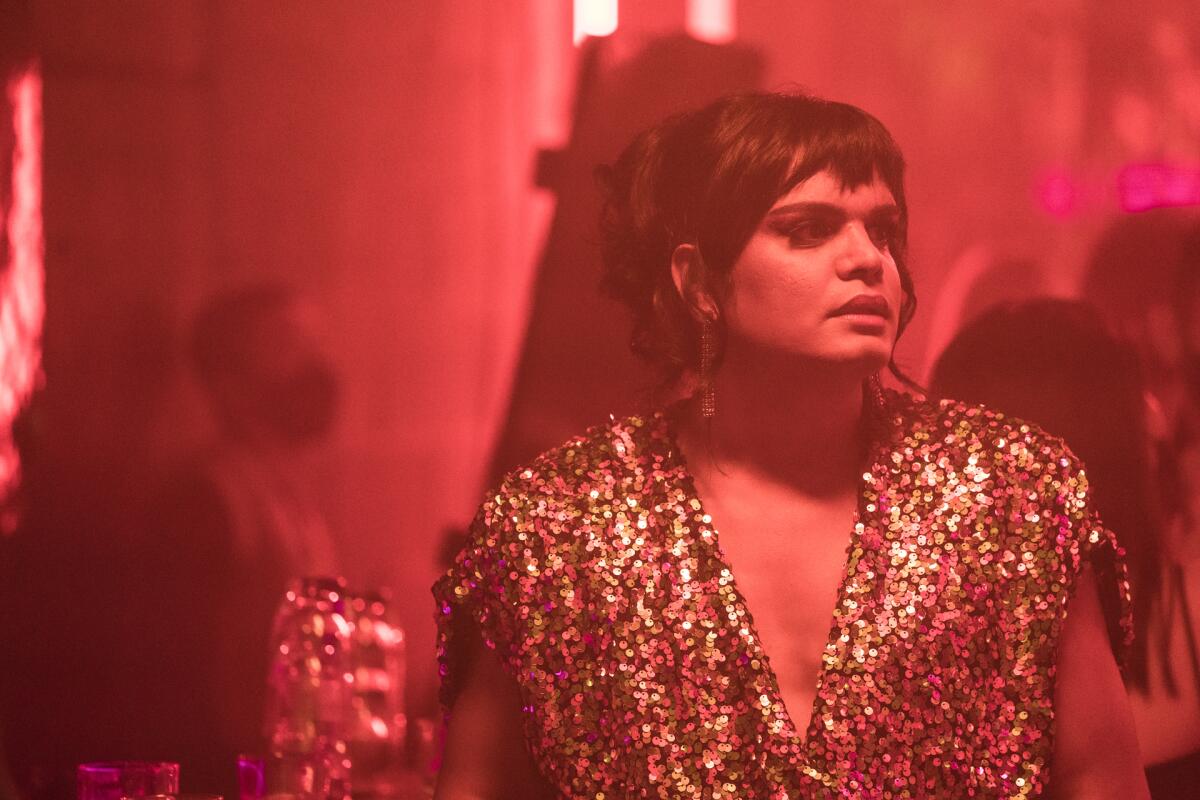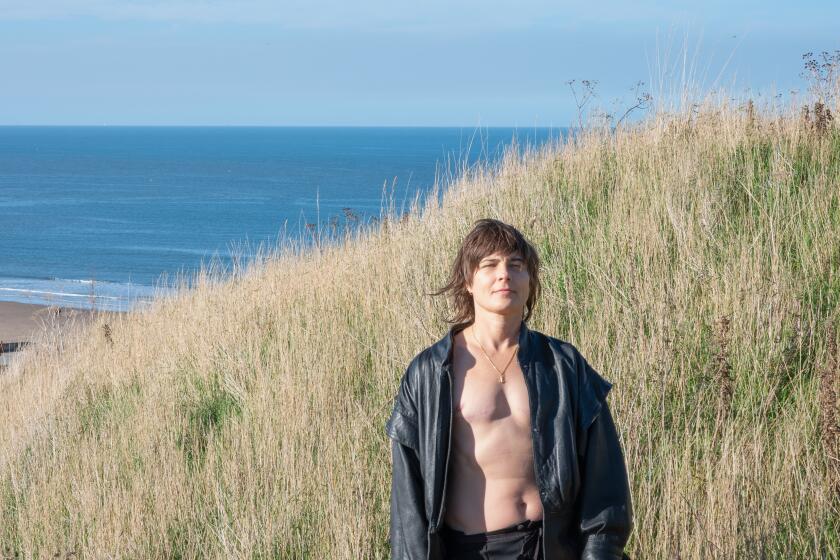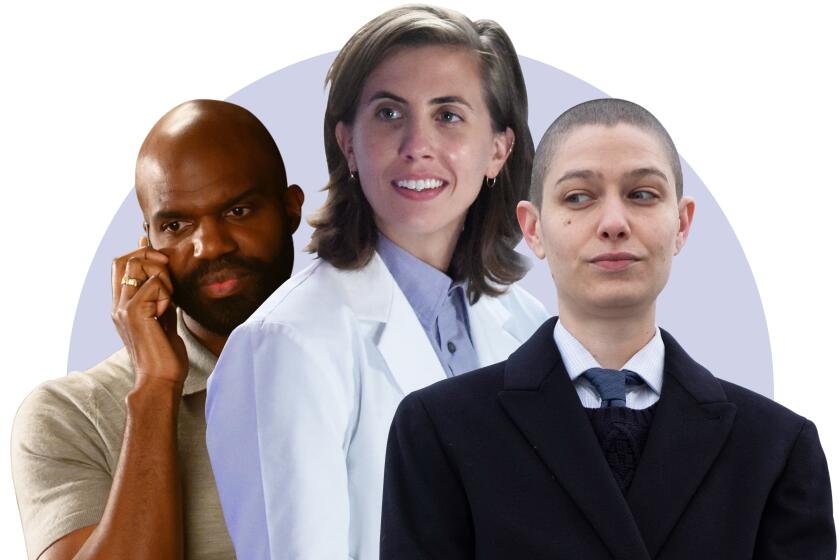HBO’s buzzy ‘Sort Of’ just had its ‘messiest’ moment yet. Let star Bilal Baig explain

- Share via
Warning: The following contains spoilers for the final two episodes of “Sort Of” Season 2.
When co-creators Bilal Baig and Fab Filippo set out to write the sophomore season of the hit half-hour comedy “Sort Of,” they knew they wanted to explore love in all its forms through the lens of a lead character who has seldom been represented on television.
“In my experience, when you get to the point of being able to let your walls down even slightly, I think that makes some space for receiving love or to be kind of curious about that,” says Baig, who plays nonbinary protagonist Sabi Mehboob. “Sabi’s walls cracked a little bit by the end [of the first season], and love really felt like the next natural thing that they’d want. And I don’t think we can talk about love without exploring where people come from, what their pasts have been like, and what their relationships to their parents are.”
The second season’s final two episodes put an emotional end to Sabi’s complicated relationship with their hidebound father, Imran (Dhirendra Miyanger), who dies abruptly of heart failure during a routine afternoon nap. The news leaves Sabi — as well as their sister, Aqsa (Supinder Wraich), and mother, Raffo (Ellora Patnaik) — reeling and sets the stage for a third season of the Canadian comedy, which HBO Max and CBC recently ordered.
Baig spoke with The Times about the decision to kill off Imran, the beautiful “messiness” of Sabi’s relationships, and the continued power and evolution of trans and nonbinary representation in mainstream media.
One of TV history’s most contested queer characters just returned to ‘The L Word.’ Actor Daniel Sea opens up about why he did it, and what it meant.
In the sixth episode, Imran pulls Sabi aside and says, “You don’t have to understand someone before loving them. I don’t understand you at all.” What did you want to accomplish with the introduction of Sabi’s father this season?
It just felt uninteresting to present a Pakistani man in his 60s as somebody who’s completely aggressive and shut down. What I love about Imran is that he, maybe for many years, got away with controlling his family and other people, and he has to reenter his family [with] each of them being a little bit surer of themselves. I think about that scene in the first episode where he’s offering Sabi the job to do this renovation for Raffo, but he’s not yelling, he’s not twisting Sabi’s arm. He’s scared just as much as Sabi is, and it’s because sensitivity is also something that runs through this family.
So it was about these two trying to find each other in the way that Raffo and Sabi actually do find each other in the first season. Sabi perceives their father as a stranger, somebody who wasn’t totally around, especially in the last chunk of years as they’ve become who they are. We could show that maybe these two have the potential to really see each other, be with each other, as father and child, but we like to break hearts too, so he passes.
Apart from wanting to break hearts, what prompted the decision to kill Imran off in the penultimate episode?
There was something that’s so deeply true about immigrant men. I know tons of older South Asian guys — my own father, uncles, friends of my father — who all struggle with some sort of health condition, and the way they repress it or pretend it’s not that big of a deal is fascinating to me. It just felt interesting to leave Sabi in perhaps the messiest place they’ve ever been by the end of the season — just to lose a complicated relationship like that while also struggling with their feelings towards Bessy [Grace Lynn Kung] and Wolf [Raymond Cham Jr.].
At the end of the finale, Sabi breaks down over the loss of their father in front of their best friend — and employer — Bessy, and they briefly kiss before Bessy says, “You should walk away right now. Please.” How did you want to play out the dynamic between Sabi and Bessy?
I’ll answer this question, but I want to talk about the bar scene in the pilot — when Bessy comes in and asks, “Will you miss me?” and Sabi’s kind of uncomfortable about it — because it’s all connected. There’s always been something about [their] dynamic that feels like it’s 10 different things at the same time. That bar scene in the pilot could be perceived as romantic, or at least a lot of my queer and trans friends were like, “Whoa, there feels like there’s something going on between Bessy and Sabi.”
Bessy feels like her whole life changed when she woke up from the coma, and we really get into Bessy’s past a little bit more this season. We’re looking at a woman who was once clearly, visibly existing in the world as a queer woman of color, which is pretty different from the way she probably gets perceived now with a white husband and two mixed race kids. [Her] need for Sabi is layered in the dynamic. And to flip it, in my preparation for this character, I firmly believe Bessy was the first person who saw Sabi [as a nonbinary person]. We say in Season 1 that they’d never been asked what their pronouns were until Bessy asks [them]. In that deep need, for sure there’s a toxic mess, but there’s also a kind of beauty when you feel so deeply connected to somebody in the world.
But Sabi also has a fascinating relationship with Bessy’s husband, Paul (Gray Powell). Sabi has essentially been co-parenting with Paul when Bessy has been incapacitated, and Sabi literally leans on Paul for support at one point during the funeral in an act of defiance against some disapproving funeral-goers.
We always talk about queerness as this super expansive term when we’re in the writers’ room. … [It] does apply to everyone. That’s not saying that everyone identifies as queer, but queerness, at least to me, is something in the air. It’s a feeling, it’s a dynamic, that kind of surprises you. We were really moved by this conversation that the audience actually never gets to see — which is, after Season 1 ends, Paul and Sabi calling each other and missing each other on the phone. Sabi has a lot of sympathy for Paul, given everything he’s juggling in terms of Bessy coming back and breaking up with him and then juggling the kids, of course.
I like when people put their own [labels] on these relationships and see what they need to see, but we are interested in continuing to [add] nuance [to] their dynamic, and it isn’t just because they’re so different — Paul being cis and white and Sabi being trans and brown. We want to offer to the world [the idea] that these two can really function together and have lots of different shades to their relationship. I think a lot of people felt in Season 1 that Paul wasn’t very kind … but I’ve always seen it as two people who are figuring a lot of stuff out along the way.
The best actor/actress divide leaves nonbinary performers like E.R. Fightmaster in a difficult position. And they say ‘sexism’ is at the heart of it.
How have you and the writers attempted to find humor in the seemingly quiet and mundane moments of everyday life? What do you think are the keys to making this specific story feel relatable and universal?
A lot of things get pitched and, ultimately, the things that stick are the ones that just feel truthful. What makes [the characters] funny to me is that they’re trying their best to be themselves and manage these complicated relationships that they have with people in this world. That’s an incredibly human thing … and these journeys can be subtle.
Transition has always been perceived as this huge, life-changing thing [where] you can never go back once you cross that threshold, and I think one of the coolest things we’re offering to the world is that [transitioning] looks like so many different things. And every day, we’re a little bit different. There’s an ease as well — we’re not heavy-handed, we steer clear from over-sentimentality and big bold letters, like, “This is our political opinion!” We just let characters be.
Have there been any specific reactions from viewers that have really stood out to you?
I get a fair amount of DMs telling me about people who, through the existence of the show, have felt more certain than ever about their gender journey or transition. I thought a lot about [how] conversations between children and parents might be unlocked through the show, particularly in South Asian and brown families, and that is happening for sure. That felt affirming and exciting.
But I didn’t understand or anticipate how Sabi just existing would mean so much to so many people. I get messages from people of all ages, all genders, all races — white folks included — saying that the show has touched them in some way, or it leaves them reflecting on their own relationships.
How does it feel to make history as one of the few nonbinary leading characters on television?
I think we know, mostly as a [global] society, that there is power in seeing yourself represented honestly in media in any way, so I’m aware of that and love that that’s happening … and also staying chill. [Laughs.] I’m a quieter person; I’m deeply nervous and shy all the time. So I’ve got a good balance going on, and that’s the thing I want to continue to protect as I move through this industry. This was all new for me — it’s my first time acting [on] camera and also producing, co-showrunning and writing for television.
What do you think is the next step in the evolution of trans and nonbinary representation?
This show works because I was invited behind the scenes from the beginning. It was always Fab and I’s project, even though I was the one who had way less experience in television across the board. So if it’s possible here with us and it worked, then I think that’s the next step. It’s nice to have us in big decision-making creative roles as directors, producers and showrunners — and I think that’s happening — but it’s the only way forward, because the quality of the work does transform when you have those communities in every part of the process.
“Sort Of” was just renewed for a third season. What will the next chapter of this story look like?
We weren’t completely sure how audiences would receive the ending of the second season, and I’m hearing a lot of different, complicated, nuanced reactions. Nothing that’s necessarily “bad,” but people are aware that this is a moment between an employer [Bessy] and an employee [Sabi] when you look at it just through that lens, right? The fact that people are talking about it and picking it apart means that we can go deeper into the mess of all these characters’ lives [and] really embrace that everyone, including trans people, is fallible — and also not in a down-punching kind of way, but in a “we’re all human and moving through life” kind of way. My hope is that we can really watch someone like Sabi go through a kind of grief that’s also a little confusing, because did [they] really love this person who helped birth [them] into the world?
More to Read
The complete guide to home viewing
Get Screen Gab for everything about the TV shows and streaming movies everyone’s talking about.
You may occasionally receive promotional content from the Los Angeles Times.








